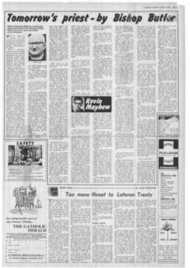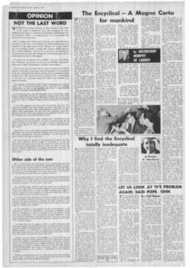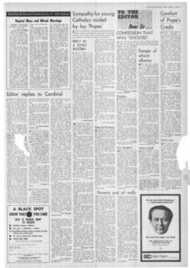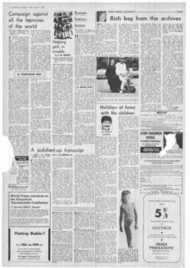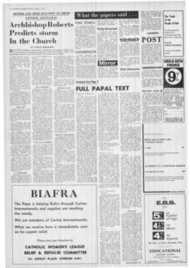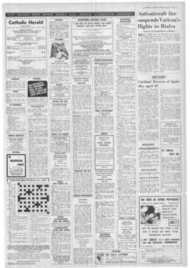Page 1, 2nd August 1968
Page 1
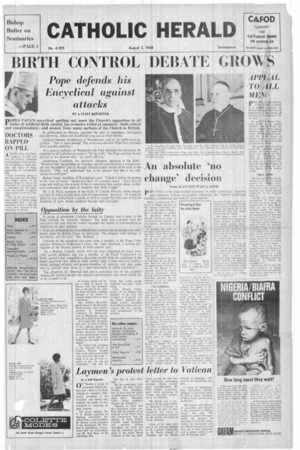
Report an error
Noticed an error on this page?If you've noticed an error in this article please click here to report it.
Tags
Share
Related articles
Encyclical Row Still Rages
Theologian Defends Pope's Authority
C.h. And The Encyclical
Full Text Inside
Priests Who Can't Agree With The Pope's Encyclical
Pope defends his Encyclical against attacks
BY A STAFF REPORTER
-DOPES PAUL'S encyclical spelling out anew the Church's opposition to all I forms of artificial birth control, has evoked a welter of comment both critical and complimentary—and protest from many sections of the Church in Britain.
Its publication on Monday signalled the start of arguments, theological and otherwise, which will reverberate long and at times bitterly.
Cardinal Heenan, Archbishop of Westminster, said of the 6,000-word encyclical : "This is clear enough. This is no snap decision. Pope Paul consulted every possible authority."
At a general audience on Wednesday the Pope defended the encyclical. He appealed to all Catholics to accept it "for its truth." The Pope said that he had arrived at his decision after "no small suffering."
Archbishop Cardinale, the Apostolic Delegate, speaking in the B.B.C. "World at One" programme on Tuesday, said the encyclical was a compassionate one throughout and he thought Church leaders would all be loyal to the directive. "They will understand that at the present time this is the only answer he could give."
Bishop Casey, Auxiliary of Westminster, said : "I think it will be the parting. of the -vays for many." Archbishop Beck of Liverpool stated : "There may be some who will say this is hard. If this is something they cannot abide, in their own consciences, they must do whatever they think is right."
Dr. J.. G. Frost, secretary of the Guild of Catholic Doctors, while conceding that the ruling would create some disappointment, declared : "It would be hard for any conservative Catholic to have to accept that what was wrong for hundreds of years should suddenly become right overnight."
Opposition by the laity
A group of prominent Catholic laymen on Tuesday sent a letter to the Pope through the Apostolic Delegate. The letter was a protest over the encyclical and said that the writers regarded the matter of contraception as remaining an open question.
A group of Dominicans from Blackfriars, Oxford, also protested over statements made by Bishop Casey on television. "We listened with feelings of incredulity and betrayal," they declared.
Criticism of the encyclical also came from a member of the Papal Commission. Writing in Wednesday's Times, Dr. John Marshall, a leading protaganist of the rhythm method of birth control, said :
"As a Roman Catholic doctor who has been concerned for many years with rmirital problems and was a member of the Papal Commission on birth control I feel compelled to dissociate myself from the statement in the papal encyclical that artificial birth control opens a wide and easy road towards conjugal infidelity and general lowering of morality and may cause men to consider their wives as a mere instrument of selfish enjoyment."
This allegation, Dr. Marshall said, cast a gratuitous slur on the countless responsible married people who practise contraception and whose family life is ail example to all.
A London parish will begin a week of prayer on Sunday with the . intention that at the end of the week the Pope will give a further message to the world—"a message which will ease their consciences."
Mgr. Anthony Reynolds, parish priest of the Borough, South London, and a former secretary to Archbishop Cowderoy of outhwark, said on Wednesd y that he had sent a letter t4 the Pope. In his letter Mgr. Reynolds had said: "I write! on behalf of my suffering 'Peopk. In spite of the authoritative and solemn statement contained in your encyclical just issued, a greater doubt than ever remains in the minds of our people." Dr. Cecily Clark. president of the National Board of Catholic Women. thought that on the whole good would come out of the encyclical. "I think if we can all work together in this, we can • get somewhere." She had no doubt that young people would be "very angry" at the ruling.
Lady Antonia Fraser, mother of six children and daughter of the Earl and Countess of Longford. said the Pope's judgment precluded mothers absolutely from following their own consciences. She was "passionately disappointed" at the decision.
blog comments powered by Disqus




